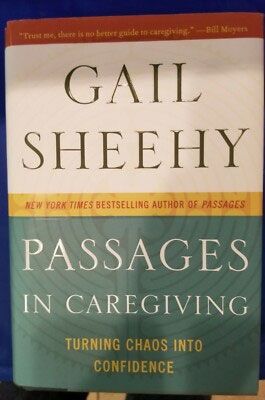November 1, 2025
Being in the home for the aged run by the little sisters of the poor at Maroli for a month and staying at Fatima Retreat House where most of the senior Jesuits reside and living at very close proximity of St Zuze Vaz Home, where the retired diocesan priests live, I wanted to understand the concept of care giving. Then I found the book ‘Passages in Caregiving: Turning Chaos into Confidence’ by Gail Sheehy.
In this book, the renowned writer and journalist, Gail Sheehy, not only narrates her personal caregiving experience but also uses that experience as a source for skilled and empathetic guidance for millions of people who are at the same, i.e. looking after their loved ones.

Eight Passages of Caregiving
Shock and Mobilization: The first step of this journey is the appointment - a split second that breaks the usual and immediately leads to disbelief. Sheehy relates the experience of being paralyzed and confused while at the same time rushing to get information, consulting with the doctors, and making urgent decisions.
The New Normal:The caregiver's life takes the shape of the patient. Changes in roles, shift in the order of priorities and scheduling of time for medical appointments and emotional strength have all taken place. Sheehy points out the great adaptive force that is needed to go through the altered beat of life.
Boomerang: One of the main characteristics of this stage is the quick succession of hope and despair — when symptoms improve on some days and worsen on the others. The caregiver's feelings are swinging between hope and weariness, very often the caregiver is giving up his/her own wellness for the sake of the patient.
Chaos: The crisis of caregiving is located at its core. Exhaustion, loneliness and irritation have taken over. In an open and direct manner, Sheehy shows how caregivers at times come to the point of breaking, feeling their pain increased by the medical system, emotional drudgery and money matters. But she points out that recognizing the burnout is not a sign of weakness but rather an essential step towards healing.
Hanging On: Caregivers are not easily overwhelmed, rather they are able to crisis-ups and downs with resolute determination. Not only the practical adjustments like keeping medical files sorted, asking for older people care, and the formation of upholding systems will be necessary but also they will be needed to survive amid the storm. Sheehy recommends to every caregiver to establish what she calls a "circle of care," which is a network made up of family, friends, professionals, and community resources.
The Inevitable Roller Coaster: Sickness seldom takes a direct route. Patients experience going back and forth, coming out for a while, and also the situation getting very quiet. Through the narrative of Sheehy, the saga of chronic disease is shown with all its unpredictable aspects and the way caregivers have to learn to be flexible and emotionally stable.
Transition: At the time when life is ebbing away, caregivers are put through a hard and painful task of detachment. Sheehy shows her love for her husband by narrating how she supported him through his last moments — sheilding herself with loving kindness but at the same time being alert to the danger of giving up on herself.
Renewal: The last section is one of mending and contemplating. Caregivers after the death of their beloved ones eventually come back to their original selves with the process of learning how to merge the experience with that of the new purpose in life being the basis of their being renewed. Sheehy points out that despite the taking-up-of-the-whole-day-and-night caregiving can in turn be very rewarding in terms of personal development, empathy, and wisdom that one reaches when being caring.
Themes and Insights
The very main point drawn out by Sheehy’s work is that caregiving is a very personal and also a collective journey. She is adamant that no caregiver should be left to walk alone. The author throughout the book delineates the significance of community — family, friends, healthcare professionals, and social networks — as the main pillars of strength.
The author writes with a tone that is sympathetic and pragmatic at the same time and skillfully combines research, interviews, and personal experience. To the very end, she is giving moral support and providing very practical tools — from navigating hospital systems to dealing with emotional breakdowns. The author’s writing style is such that she keeps on with the journalistic precision while allowing the reader to see her through the sheer honesty, thus making the book both informative and powerful in terms of its emotional impact.
Caregiving as Transformation
The caregiver’s journey, according to her, is not just about sustaining another’s life but also about unpacking one’s own compassion to the deepest degree. It is a call to grow through the act of serving, to claim the worth of one’s being, and to see love not as a feeling but as a constant choice.
Gail Sheehy’s Passages in Caregiving, therefore, is both a source of practical wisdom and a monument to the strength of the human spirit. It reassures every caregiver that even amidst the unpredictable nature of sickness, one can indeed move — step by step — from chaos to confidence.